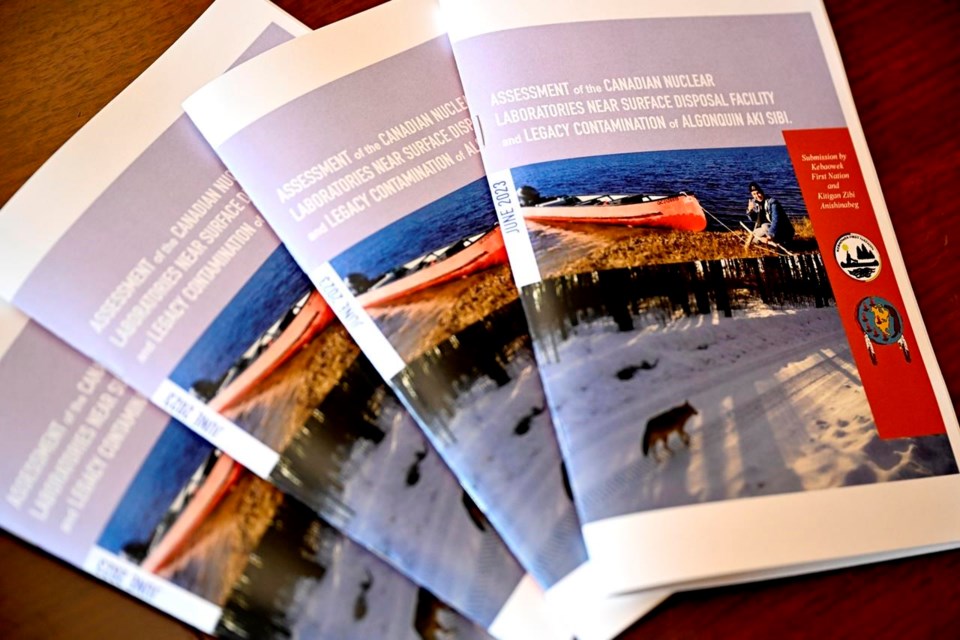OTTAWA — Several First Nations are sounding the alarm about a proposed nuclear waste facility near the Ottawa River, as Canada's nuclear regulator decides whether the project should be approved.Â
The 91Ô´´ Nuclear Safety Commission held a final public hearing about the matter on Thursday after pausing its decision to move ahead with the site last year amid the criticism.
"When building a camp and you need potable drinking water and you build a well, you don't go and build your outhouse beside that well," said councillor Justin Roy of Kebaowek First Nation.
"That is what (the Near Surface Disposal Facility) is trying to do here."Â
The facility is slated to be built on the Chalk River Laboratories site in Deep River, Ont., about 180 kilometres northwest of Ottawa. The lab tests nuclear technology.
The site sits within a kilometre of the Ottawa River, or the Kichi Sibi as it is known in the Algonquin language, and is located near sacred sites at Oiseau Rock and Pointe au BaptĂŞme.
Kebaowek First Nation and Kitigan Zibi Anishinabeg's traditional territories surround the river in both Ontario and Quebec, and both have staunchly opposed the site's development.
The proposed Near Surface Disposal Facility consists of nine disposal cells and a base liner, along with systems to collect leachate, monitor the environment and detect leaks, according to a description of the facility on the 91Ô´´ Nuclear Safety Commission's website.Â
It's expected to have an operating life of at least 50 years should the commission approve its development, and will hold up to a million cubic metres of low-level radioactive waste.
Reneé Pelletier, a lawyer who made submissions on behalf of both First Nations, said they were not adequately consulted on the project, and that consultation was done too late in the process.
"(Commission) staff were very clear they were not interested in revisiting aspects of the (environmental) assessment that had already taken place," said Pelletier.Â
"They were only interested in receiving information from the First Nations about their rights. And, with respect, this is not consultation. This is box-checking."
The 91Ô´´ Nuclear Safety Commission launched an environmental assessment of the site in 2016, but First Nations say the assessment wasn't culturally relevant, leading them to pen their own. It was released in June.
Their report notes that the area around Chalk River was never ceded by the Anishinabeg people, nor were they consulted when the original Chalk Rivers Laboratories site was developed.
Kitigan Zibi Anishinabeg and Kebaowek First Nation "have never provided their free, prior and informed consent to (this) development. It is instead the result of dispossession and restricting Indigenous Peoples' access to their own territory," the report reads.Â
Among the First Nations' concerns are the possible effects the nuclear waste site could have on cultural practices, wildlife and the land, as well as whether there is potential for radioactive waste to leach into the supply of drinking water for those who live in the river's watershed.
91Ô´´ Nuclear Laboratories, the corporation responsible for the site, also presented its final arguments on Thursday.
It maintained the nuclear waste site is safe and wouldn't threaten drinking-water sources.
The company also said its engagement with Indigenous communities and organizations has been "robust and meaningful."
No deadline for a final decision on the site's future has been set, but the commission said Thursday that the process could take "several months."Â
Last month, the Assembly of First Nations passed a resolution at its annual general assembly calling for a meeting with Ottawa about nuclear sites and the disposal of nuclear waste near First Nations communities.
Chief Lance Haymond of Kebaowek First Nation led the charge.
This report by The 91Ô´´ Press was first published Aug. 10, 2023.
Alessia Passafiume, The 91Ô´´ Press



